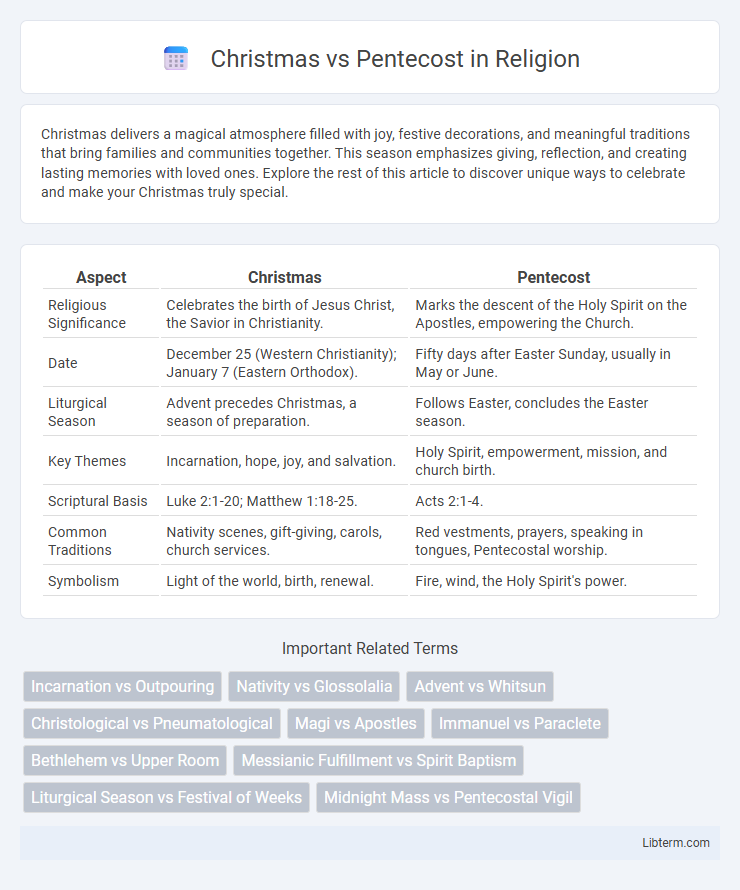Christmas delivers a magical atmosphere filled with joy, festive decorations, and meaningful traditions that bring families and communities together. This season emphasizes giving, reflection, and creating lasting memories with loved ones. Explore the rest of this article to discover unique ways to celebrate and make your Christmas truly special.
Table of Comparison
| Aspect | Christmas | Pentecost |
|---|---|---|
| Religious Significance | Celebrates the birth of Jesus Christ, the Savior in Christianity. | Marks the descent of the Holy Spirit on the Apostles, empowering the Church. |
| Date | December 25 (Western Christianity); January 7 (Eastern Orthodox). | Fifty days after Easter Sunday, usually in May or June. |
| Liturgical Season | Advent precedes Christmas, a season of preparation. | Follows Easter, concludes the Easter season. |
| Key Themes | Incarnation, hope, joy, and salvation. | Holy Spirit, empowerment, mission, and church birth. |
| Scriptural Basis | Luke 2:1-20; Matthew 1:18-25. | Acts 2:1-4. |
| Common Traditions | Nativity scenes, gift-giving, carols, church services. | Red vestments, prayers, speaking in tongues, Pentecostal worship. |
| Symbolism | Light of the world, birth, renewal. | Fire, wind, the Holy Spirit's power. |
Introduction: Understanding Christmas and Pentecost
Christmas celebrates the birth of Jesus Christ, marking the incarnation of God in Christian theology, traditionally observed on December 25th. Pentecost commemorates the descent of the Holy Spirit upon the apostles, occurring fifty days after Easter, symbolizing the birth of the Christian Church. Both festivals hold profound spiritual significance, representing foundational events in the Christian faith.
Historical Origins of Christmas and Pentecost
Christmas originated as a Christian holiday celebrating the birth of Jesus Christ, traditionally dated December 25th, and has roots in Roman winter solstice festivals and early Christian efforts to replace pagan celebrations. Pentecost, occurring fifty days after Easter, commemorates the descent of the Holy Spirit on the apostles as described in the Acts of the Apostles, marking the birth of the Christian Church. While Christmas blends historical, religious, and cultural elements from ancient Roman and Christian traditions, Pentecost is primarily a biblical event with strong theological significance in Christian liturgy.
Biblical Foundations: Key Scriptures
Christmas centers on the incarnation of Jesus Christ, with Luke 2:1-20 and Matthew 1:18-25 emphasizing His miraculous birth fulfilling Old Testament prophecies like Isaiah 7:14. Pentecost commemorates the outpouring of the Holy Spirit in Acts 2:1-4, marking the birth of the Church and the fulfillment of Jesus' promise in John 14:26 and Joel 2:28-29 about the Spirit's arrival. Both events are pivotal in Christian theology, highlighting God's redemptive plan through Christ's incarnation and the empowering presence of the Holy Spirit.
Significance in Christian Theology
Christmas marks the Incarnation of Jesus Christ, emphasizing God's entry into human history as both fully divine and fully human, which serves as the foundation for salvation. Pentecost represents the outpouring of the Holy Spirit onto the apostles, signifying the birth of the Church and the empowerment of believers to continue Christ's mission on earth. Both events are pivotal in Christian theology, highlighting God's intervention in history--first through Jesus' birth and then through the Spirit's presence in the Church.
Rituals and Traditions: Celebrating Christmas vs Pentecost
Christmas rituals center on nativity scenes, gift-giving, and festive meals that commemorate the birth of Jesus Christ, often featuring decorations like Christmas trees and lights. Pentecost traditions emphasize the descent of the Holy Spirit, with church services, prayers, and the wearing of red vestments symbolizing spiritual renewal and empowerment. While Christmas involves widespread secular and cultural celebrations, Pentecost remains primarily a solemn religious observance marked by specific liturgical rites and community gatherings.
Symbolisms and Key Themes
Christmas symbolizes the birth of Jesus Christ, representing hope, light, and divine incarnation with themes of joy, peace, and salvation. Pentecost celebrates the descent of the Holy Spirit upon the apostles, symbolizing empowerment, spiritual renewal, and the birth of the Church with key themes of faith, unity, and the spreading of the gospel. Both holidays emphasize transformative moments in Christian faith, highlighting divine intervention and the relationship between God and humanity.
Differences in Church Observances
Christmas commemorates the birth of Jesus Christ and is celebrated with liturgical services featuring nativity scenes, carols, and the Advent season preparation. Pentecost marks the descent of the Holy Spirit upon the apostles, observed fifty days after Easter with special readings, prayers, and the wearing of red vestments symbolizing the Holy Spirit. The distinct theological themes influence church rituals, with Christmas emphasizing incarnation and Pentecost highlighting spiritual empowerment and the birth of the Church.
Cultural Impact and Global Celebrations
Christmas, celebrated on December 25th, exerts a profound cultural impact worldwide, marked by traditions such as gift-giving, festive decorations, and family gatherings that foster a strong sense of community and joy. Pentecost, occurring 50 days after Easter, holds significant religious importance in Christian communities, emphasizing spiritual renewal and the Holy Spirit's descent, often observed through church services and prayer. While Christmas transcends religious boundaries with widespread secular festivities, Pentecost remains primarily a liturgical event shaping cultural practices within Christian denominations globally.
Shared Values and Distinctive Messages
Christmas and Pentecost both celebrate key events in Christian faith, emphasizing themes of hope, renewal, and divine presence. Christmas marks the birth of Jesus Christ, highlighting God's incarnation and the gift of salvation to humanity. Pentecost commemorates the Holy Spirit's descent on the apostles, symbolizing empowerment, spiritual awakening, and the birth of the church.
Conclusion: Spiritual Importance in the Christian Calendar
Christmas and Pentecost hold distinct spiritual importance in the Christian calendar, marking pivotal moments in the faith journey. Christmas celebrates the incarnation of Jesus Christ, symbolizing hope, salvation, and divine love entering the world. Pentecost commemorates the descent of the Holy Spirit, empowering believers with spiritual gifts and establishing the early Church's mission and unity.
Christmas Infographic

 libterm.com
libterm.com